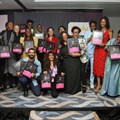
The winners were announced on Saturday. Source: Supplied.
Migration, identity and confronting one’s past are at the heart of current global debates. It is this theme, coupled with superb cinematic aesthetics, that struck the chords of the international jury that selected the film directed by Anthony Shim.
The festival came to a close on Saturday night with the announcement of the award winners. South Africa walked away with four awards.
A success
This year's festival was an overall success with audiences watching over 89 films from 54 countries at CineCentre Suncoast, KZNSA and five community arts centres.
Festival manager and head of programming, Andrea Voges, expressed her appreciation for the audiences who attended the festival: “It was inspiring to see audiences coming to the cinema. It shows us that there is huge enthusiasm from our South African audiences for high-quality arthouse films at the festival. It encourages us to continue to develop and we look forward to DIFF2024.”
The festival jury described Riceboy Sleeps as an epic tale of a single parent's journey of forging a new future for her son in a foreign land.
The movie touched on themes of identity, parental love, mortality, and confronting one's past, while being lyrical and cinematically tender in its offering. Moreover, the jury was particularly impressed with the lead actress, Choi Seung-Yoon, who was awarded Best Actress. Her mannerisms, tone, and dialogue fully immersed viewers in the story and solidified her place as deserving of the award.
The winners were announced to an enthusiastic live audience at CineCentre Suncoast Cinema. Lila Avilés earned the Best Director award for her remarkable film Totem a co-production between Mexico, Denmark and France. Likewise, Baloji was unanimously awarded the Best African Feature Film award for his brave debut, Omen, co-produced with Belgium, the Democratic Republic of Congo, France, and the Netherlands.
Fresh take
The awards for this year’s Best Screenplay went to Amr Gamal and Mazen Refaat for their incredible work on The Burdened, a co-production between Yemen, Sudan, and Saudi Arabia. Although the theme of abortion is one that is universal, the jury found the writing and perspective of the film to be a welcomed fresh take.
The jury was impressed with Piyush Puty's work as the cinematographer for Joram, awarding him the Best Cinematography award. Lead actor Manoj Bajpayee received the Award for Best Actor.
The Best South African Feature Film award at the festival was presented to Runs in the family, a film directed by Ian Gabriel that was commended for providing a space for greater inclusion, respect, and acceptance of the LGBTQIA+ community.
The festival management and features jury jointly awarded the Lifetime Achievement Award to Mapantsula.
The mother of all lies (Morocco, Qatar, Saudi, Arabia, Egypt), directed by Asmae El Moudir, was awarded Best Documentary, with the jury finding themselves unanimously captivated by this cinematic masterpiece.
Best African Documentary was awarded to Le Spectre de Boko Haram from Cameroon, a sensitive and delicate film that the jury thought was approached with a deeply respectful eye by director Cyrielle Raingou.
Poetic work
Lastly, the Best South African Documentary was bestowed upon Milisuthando, directed by Milisuthando Bongela. The jury found Milisuthando to be a strikingly poetic piece of work that truly strives to invent a cinematic language that can accurately express the nuances and complexities of South Africa and her people.
This year’s shorts jury had the challenging task of selecting the winners from an impressive selection of 25 short films. Even more excitingly, the Best Short Film category was approved as a qualifying award for the Academy’s Short Films Qualifying Festival List; and thus making the Best Documentary and Best Short Film categories at the DIFF now eligible to submit for an Oscar win.
Will you look at me, directed by Shuli Huang, was awarded the Best Short Film for its delicate, potent, and masterfully composed filmmaking. Tanzanian Apostles of cinema, directed by Darragh Amelia, Gertrude Malizana, Jesse Gerard Mpango, and Cece Mlay, was awarded Best African Short Film for its captivating and entertaining depiction of the lasting legacy of cinema in remote corners of the continent.
Mirror Mirror, directed by Sandulela Asanda, was awarded Best South African Short Film,
This year's festival saw the 2nd edition of the Isiphethu International Student Film Festival which aims to create a platform and gateway for students by exposing them to the role players in the film industry and showcasing their work on big cinema screens.
The Best Student Film was won by A roadside banquet, directed by Chinese student Peiqi Peng for its exceptional ability to weave a potent visual narrative, effectively portraying the inner emotions of the protagonist.
The Afrikaans Student Film by Leandros Brown and Daniel Howells, Hibernation, took the award for Best South African Film.
Amnesty International Durban Human Rights Award was awarded to Beyond Utopia, for raising awareness of the long hidden gross human rights violations in North Korea.
The 44th Durban International Film Festival, presented by the Centre for Creative Arts at the University of KwaZulu- Natal, is presented with support from the National Film and Video Foundation, Kwazulu-Natal Film Commission, the Durban Film Office, The National Institute for Humanities and Social Sciences, and the Avalon Group. The management of the festival promises an even more exciting and bumper 45th-anniversary edition of the festival in 2024.









































